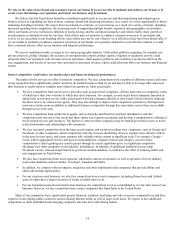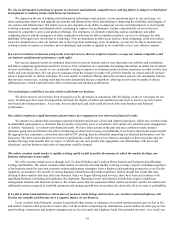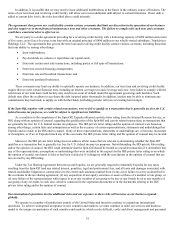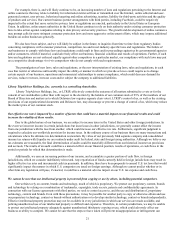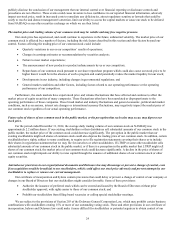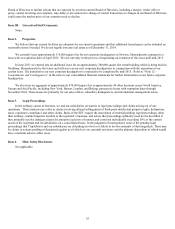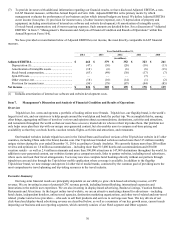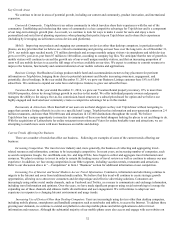TripAdvisor 2014 Annual Report Download - page 34
Download and view the complete annual report
Please find page 34 of the 2014 TripAdvisor annual report below. You can navigate through the pages in the report by either clicking on the pages listed below, or by using the keyword search tool below to find specific information within the annual report.24
publicly disclose the conclusion of our management that our internal control over financial reporting or disclosure controls and
procedures are not effective. These events could cause investors to lose confidence in our reported financial information, adversely
impact our stock price, result in increased costs to remediate any deficiencies, attract regulatory scrutiny or lawsuits that could be
costly to resolve and distract management’s attention, limit our ability to access the capital markets or cause our stock to be delisted
from NASDAQ or any other securities exchange on which we are then listed.
The market price and trading volume of our common stock may be volatile and may face negative pressure.
Our stock price has experienced, and could continue to experience in the future, substantial volatility. The market price of our
common stock is affected by a number of factors, including the risk factors described in this section and other factors beyond our
control. Factors affecting the trading price of our common stock could include:
x Quarterly variations in our or our competitors’ results of operations;
x Changes in earnings estimates or recommendations by securities analysts;
x Failure to meet market expectations;
x The announcement of new products or product enhancements by us or our competitors;
x Repurchases of our common stock pursuant to our share repurchase program which could also cause our stock price to be
higher than it would be in the absence of such a program and could potentially reduce the market liquidity for our stock;
x Developments in our industry, including changes in governmental regulations; and
x General market conditions and other factors, including factors related to our operating performance or the operating
performance of our competitors.
Furthermore, the stock markets have experienced price and volume fluctuations that have affected and continue to affect the
market prices of equity securities of many companies. These fluctuations often have been unrelated or disproportionate to the
operating performance of those companies. These broad market and industry fluctuations and general economic, political and market
conditions, such as recessions, interest rate changes or international currency fluctuations, may negatively impact the market price of
our common stock regardless of our actual operating performance.
Future sales of shares of our common stock in the public market, or the perception that such sales may occur, may depress our
stock price.
For the period ended December 31, 2014, the average daily trading volume of our common stock on NASDAQ was
approximately 2.2 million shares. If our existing stockholders or their distributees sell substantial amounts of our common stock in the
public market, the market price of the common stock could decrease significantly. The perception in the public market that our
existing stockholders might sell shares of common stock could also depress the trading price of our common stock. In addition, certain
stockholders have rights, subject to some conditions, to require us to file registration statements covering their shares or to include
their shares in registration statements that we may file for ourselves or other stockholders. If LTRIP or some other stockholder sells
substantial amounts of our common stock in the public market, or if there is a perception in the public market that LTRIP might sell
shares of our common stock, the market price of our common stock could decrease significantly. A decline in the price of shares of
our common stock might impede our ability to raise capital through the issuance of additional shares of our common stock or other
equity securities.
Anti-takeover provisions in our organizational documents and Delaware law may discourage or prevent a change of control, even
if an acquisition would be beneficial to our stockholders, which could affect our stock price adversely and prevent attempts by our
stockholders to replace or remove our current management.
Our certificate of incorporation and bylaws contain provisions that could delay or prevent a change of control of our company or
changes in our Board of Directors that our stockholders might consider favorable. Some of these provisions:
x Authorize the issuance of preferred stock which can be created and issued by the Board of Directors without prior
stockholder approval, with rights senior to those of our common stock; and
x Prohibit our stockholders from filling board vacancies or calling special stockholder meetings.
We are subject to the provisions of Section 203 of the Delaware General Corporation Law, which may prohibit certain business
combinations with stockholders owning 15% or more of our outstanding voting stock. These and other provisions in our certificate of
incorporation, bylaws and Delaware law could make it more difficult for stockholders or potential acquirers to obtain control of our


